What is the story about?
What's Happening?
Mark Hamill, renowned for his role as Luke Skywalker in the 'Star Wars' series, has expressed concerns over the rise of AI actors, describing them as 'terrible, ghastly, ghoulish, and weird.' Hamill's comments come amidst discussions about AI-generated performers potentially being signed by talent agencies. He fears the implications of AI using his likeness posthumously, questioning the ethical dimensions of such technology. Hamill also reflected on his career, particularly his role in 'The Life of Chuck,' a film adaptation of Stephen King's novella, which won the Toronto International Film Festival Audience Award in 2024. The film, directed by Mike Flanagan, explores themes of memory and mortality, offering Hamill a departure from his iconic roles. Hamill's career spans decades, including voice work as the Joker in 'Batman: The Animated Series,' which he credits for providing artistic freedom beyond physical constraints.
Why It's Important?
The rise of AI actors poses significant ethical and legal questions for the entertainment industry, particularly concerning the use of deceased actors' likenesses. Hamill's critique highlights the potential impact on actors' legacies and the authenticity of performances. As AI technology advances, it challenges traditional notions of acting and raises concerns about consent and representation. Hamill's reflections on his career underscore the importance of artistic integrity and the evolving nature of performance art. His comments may influence industry discussions on the role of AI in entertainment, prompting stakeholders to consider the implications for actors' rights and the preservation of human creativity.
What's Next?
The entertainment industry may face increased scrutiny regarding the use of AI actors, with potential calls for regulatory measures to protect actors' likenesses and legacies. Talent agencies and production companies might need to navigate ethical considerations and public sentiment as they explore AI technology. Hamill's remarks could spark broader debates among actors, directors, and industry leaders about the future of performance art and the balance between technological innovation and artistic authenticity. As AI continues to develop, stakeholders may seek to establish guidelines to ensure ethical practices and safeguard the interests of human performers.
Beyond the Headlines
The integration of AI actors into the entertainment industry could lead to long-term shifts in how performances are created and consumed. This development raises questions about the cultural value of human artistry and the potential commodification of actors' identities. The ethical implications extend beyond individual actors, potentially affecting the industry's approach to storytelling and audience engagement. As AI technology becomes more prevalent, it may redefine the boundaries of creativity and challenge traditional artistic roles, prompting society to reconsider the relationship between technology and human expression.















